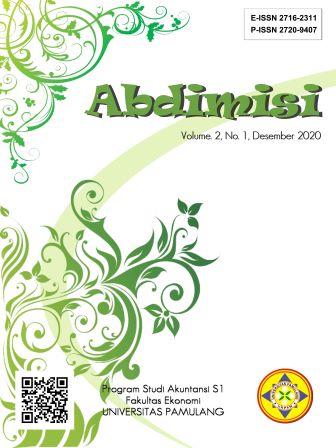Kreatifitas Pengolahan Melinjo (Gnetum Gnemon) Menjadi Emping dengan Memanfaatkan Media Sosial sebagai Alat Promosi Penjualannya dan Sosialisasi Pencatatan Keuangan Sederhana
DOI:
https://doi.org/10.32493/abms.v3i2.16999Keywords:
UMKM, Financial Statment, MarketingAbstract
UMKM are a potential business for economic development in Indonesia so that in practice it is necessary to optimize and explore the existing potentials to increase community economic development. In Perumasan Village, Kalanganyar Sub-District, Takakan District, Serang City. Banten, there are many UMKM with potential, one of which is Emping Melinjo UMKM. Emping Melinjo is a food made from saplings. When viewed from a quantity perspective, there are quite a lot of tanks in the Perumasan village, this is what encourages Emping melinjo UMKM to have promising business potential, at least to help the economy of the surrounding community. The problem is that UMKM lack knowledge regarding digital marketing and there is no management of financial Statement. The results of this community service activity are providing training and assistance related to digital marketing using Whatsaap, Instagram, Marketplace, and making simple financial report logbooksReferences
Anggraeni, Feni Dewi, Imam Hardjanto & Ainul Hayat. (2013). Pengembangan Usaha Mikro, Kecil Dan Menengah (UMKM) Melalui Fasilitasi Pihak Eksternal Dan Potensi Internal (Studi Kasus Pada Kelompok Usaha “Emping Jagung†Di Kelurahan Pandanwangi Kecamatan Blimbing Kota Malang). Jurnal Administrasi Publik Mahasiswa Universitas Brawijaya, 1(6).
Firdaus Thaha, A. (2020). Dampak Covid-19 Terhadap UMKM Di Indonesia. Brand Jurnal Ilmiah Manajemen Pemasaran, 2(1).
Saefullah, Encep, Arta Rusidarma Putra & Tabroni. (2021).
Habibah, Lyandra Aisyah Margie, Adhitya Putri Pratiwi, Afridayani & Muhammad Ridwan. (2021). Pelatihan Akuntansi Dan Pengelolaan Keuangan Pada Umkm Ratengan. ABDI LAKSANA: Jurnal Pengabdian Kepada Masyarakat Vol. 2 No. 3.
Hardilawati, W. laura. (2020). Strategi Bertahan UMKM di Tengah Pandemi Covid-19. Jurnal Akuntansi Dan Ekonomika, 10(1). https://doi.org/10.37859/jae.v10i1.1934
Idah, Y. M., & Pinilih, M. (2020). Strategi Pengembangan Digitalisasi UMKM. Prosiding Seminar Nasional Dan Call for Papers “Pengembangan Sumber Daya Pedesaan Dan Kearifan Lokal Berkelanjutan IX,†9(1).
Irawati, W., Indrayani, L., & Barli, H. (2020). Tata Kelola Keuangan Sederhana bagi UMKM di Kapuk Muara. Abdimasku: Jurnal Pengabdian Masyarakat, 3(3), 125-131.
Inovasi Dan Pengembangan Umkm Emping Melinjo Pada Masa Pandemi Covid-19 Dengan Optimalisasi Media Pemasaran Dan Alat Produksi. Reswara : Jurnal Pengabdian Kepada Masyarakat p-ISSN 2716-4861, e-ISSN 2716-3997 Volume: 2 Nomor: 2 Edisi Juli 2021.
Sarfiah, S., Atmaja, H., & Verawati, D. (2019). UMKM Sebagai Pilar Membangun Ekonomi Bangsa. Jurnal REP (Riset Ekonomi Pembangunan), 4(2), 1–189. https://doi.org/10.31002/rep.v4i2.1952
Rifai, Zanuar & Meiliana, D. (2020). Pendampingan dan Penerapan Strategi Digital Marketing Bagi UMKM Terdampak Pandemi Covid-19. BERNAS: Jurnal Pengabdian Kepada Masyarakat, 1(4). https://doi.org/10.31949/jb.v1i4.540
Downloads
Published
Issue
Section
License
Copyright Notice
Authors who publish with this journal agree to the following terms:
- Authors retain copyright and grant the journal right of first publication with the work simultaneously licensed under a Creative Commons Attribution License that allows others to share the work with an acknowledgement of the work's authorship and initial publication in this journal.
- Authors are able to enter into separate, additional contractual arrangements for the non-exclusive distribution of the journal's published version of the work (e.g., post it to an institutional repository or publish it in a book), with an acknowledgement of its initial publication in this journal.
- Authors are permitted and encouraged to post their work online (e.g., in institutional repositories or on their website) prior to and during the submission process, as it can lead to productive exchanges, as well as earlier and greater citation of published work (See The Effect of Open Access).
Abdimisi have CC-BY-SA or an equivalent license as the optimal license for the publication, distribution, use, and reuse of scholarly work.
In developing strategy and setting priorities, Abdimisi recognize that free access is better than priced access, libre access is better than free access, and libre under CC-BY-SA or the equivalent is better than libre under more restrictive open licenses. We should achieve what we can when we can. We should not delay achieving free in order to achieve libre, and we should not stop with free when we can achieve libre.
You are free to:
- Share — copy and redistribute the material in any medium or format
- Adapt — remix, transform, and build upon the material for any purpose, even commercially.
- The licensor cannot revoke these freedoms as long as you follow the license terms.

